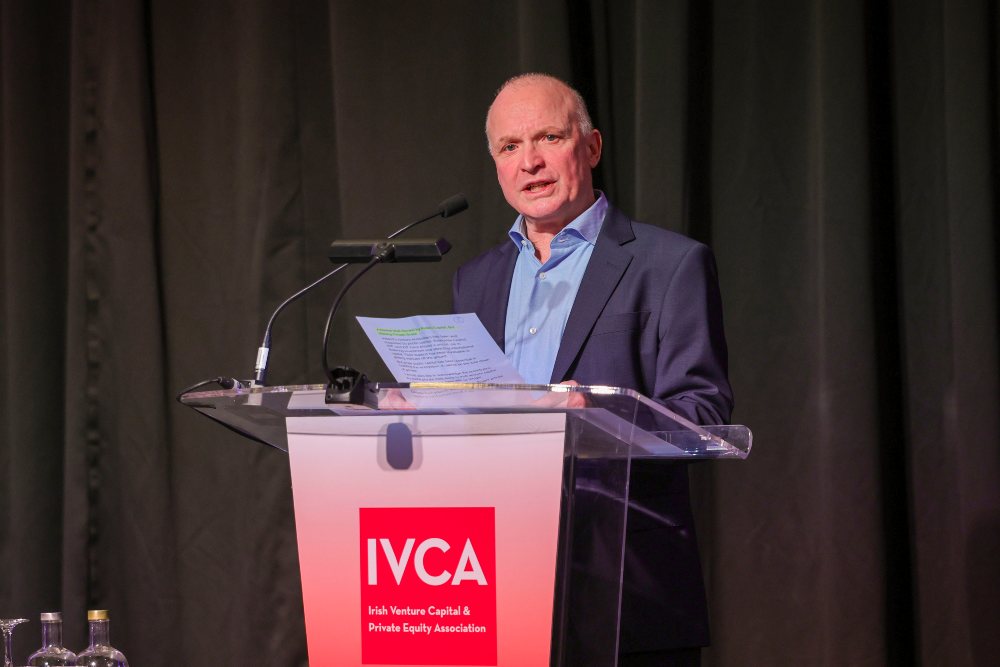Bank of Ireland’s chief economist Conall Mac Coille on what lies ahead for Ireland and the world after the Trump administration revealed its so-called Liberation Day tariff measures.
Financial markets have sold off overnight as US President Donald Trump unveiled broader and more aggressive tariffs.
Remarkably, China now faces additional tariffs exceeding 50%, with a 20% rate on Irish and EU exports imposed. However, a key development for Ireland is that pharmaceuticals are excluded.
“That pharmaceuticals will be excluded from the tariffs means that 80-90% of the nominal value of Irish exports to the US will not be affected”
This means that 80-90% of Irish exports to the United States will not be affected, so the first round negative impact of tariffs onto GDP will be negligible, albeit very difficult for some sectors. Looking forward, much will depend on whether EU/US negotiations can bear fruit.
Could negotiations stave off recession risk?
Watch Group Chief Economist Conall Mac Coille discuss what do Trump’s tariffs mean for the Irish economy and financial markets
Here, the risk the EU’s retaliatory response could include measures targeting US ‘big-tech’ firms poses another risk for Ireland’s important ICT sector.
Trump’s tariff proposals deeper than expected: Yesterday, US President Donald Trump announced a 10% uniform tariff will apply across all countries from April 5th, with additional ‘reciprocal’ tariffs from April 9th. Remarkably, this means China will face additional tariffs with the total rate now circa. 50%, with Asian counties also seeing heavy tariffs; Taiwan (32%), Thailand (36%), Vietnam (46%). The EU will face tariffs of 20% and UK 10%. The moves mean the average US tariff rate on its imports will be close to 20%, well above market expectations. However, that copper, pharmaceuticals and semiconductors are exempt, somewhat dilutes their impact.
Markets sell-off on recession risk: The magnitude of Trump’s tariff proposals are now close to his campaign commitments (10-20% universal, 60% on China). These were seen as so extreme, potentially reducing US GDP by 1-2%, and risking recession, to be taken at face value. Hence, European equity markets have sold-off this morning; EuroStoxx50 (-3.0%), Dax (-2.3%), CAC40 (-3.0%), FTSE100 (-1.5%). Options prices are now fully pricing in two further ECB deposit rate cuts to 2% by July, with a 85% probability of a further cut to 1.75% by end-2025. The dollar remains under pressure, the exchange rate vis-a-vis the euro breaking through $1.11 this morning, set for the largest one-day move since 2015.
Pharmaceutical exclusion key for Ireland: That pharmaceuticals will be excluded from the tariffs means that 80-90% of the nominal value of Irish exports to the US will not be affected. However, the US government has been expected to launch ‘Section 232’ investigations into the sector, which could lead to tariffs at a later stage. Hopefully, there is some consideration of the reality that pharmaceutical production takes years to relocate, and any tariffs will have to be borne by consumers. Of course, other exporters (outside of the pharma sector) face a difficult adjustment to the tariffs. However, that only 1-2% of Irish exports could be affected means the 1st round impact onto Irish GDP will be small.
EU-US negotiations will hopefully bear fruit: Speaking this morning Ursula von der Leyen said the EU’s approach will be to negotiate first, whilst finalising the EU’s retaliatory measures. One risk here for Ireland is that a hardening of opinion could lead to the EU targeting US ‘big-tech’ / ICT companies operating in Ireland. EU trade ministers are due to meet April 7th to discuss a response. Of course, the uncertainty created by US President Trump’s tariffs will likely delay many companies’ employment and investment plans, also acting to soften demand in the Irish economy.
-
Bank of Ireland is welcoming new customers every day – funding investments, working capital and expansions across multiple sectors. To learn more, click here
-
For support in challenging times, click here
-
Listen to the ThinkBusiness Podcast for business insights and inspiration. All episodes are here. You can also listen to the Podcast on:
-
Spotify
-
SoundCloud
-
Apple





